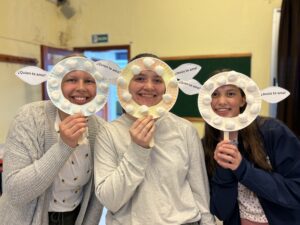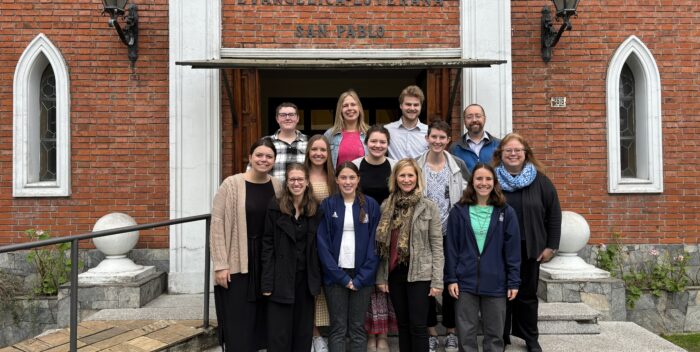Concordia offers international, domestic mission trips for students of all majors
The Uruguay mission group. Top, from left to right: Maddy Peters, Abby Heemstra, Ian Fiala, Dr. Brian Gauthier. Middle: Macy Gebhardt, Cassidy Knust, Bethany Gebhardt, Lauren Dawson, Dr. Vicki Anderson. Bottom: Abby Constien, Rachel Ada, Dr. Amy Stradtmann, Emily Loseke.
Photo credit: Erin Mackenzie
By Maddy Peters
Sports Editor
This story is featured in the October print edition of the Sower student newspaper.
It was a Friday afternoon in September when Rev. Dr. Brian Gauthier told my Doctrine and Confessions II class about the Uruguay trip.
The sign-up due date for the mission trip that Gauthier, then a Concordia theology professor, was leading was the next Monday, so he offered the opportunity as a last call for anyone who might be interested. I recently had paid off another international trip and realized I had just enough money to cover the cost. However, I was not completely sold on the idea of mission work.
I had never seriously considered doing a mission trip in the past. I did not think it would be a worthwhile use of my time and skills. But my friend spoke up and said she was going. And I thought to myself, “Well, why not?”

Abby Heemstra, Bethany Gebhardt, and Rachel Ada show off the craft they set up for their students. Photo: Maddy Peters.
That is how I ended up in a van to the Omaha airport at 2:45 a.m. on May 7 to travel to Montevideo, Uruguay, to spend just over a week at Colegio y Liceo San Pablo school doing Christian education and English as a second language work. It was one of the best decisions I have ever made.
Concordia offers numerous mission opportunities, with trips hosted by staff and faculty or coordinated with partners from different organizations. Julie Hermann is director of Global Opportunities at Concordia and her job is to advertise and help connect students with whatever international trip they think suits them.
Concordia is currently sponsoring three major trips, including the annual Beautiful Feet conference held at Concordia St. Paul in November, the Mission Cambodia—The Kingdom of Wonder trip hosted by Dr. John Mehl, executive director of Mission of Christ Network and a Concordia adjunct, in May, and a mission to Puerto Rico hosted by Debbie Brutlag, the administrative assistant for the Music Department, also in May.
Concordia also partners with St. John Lutheran Church in Seward for their annual Alaska mission trip in June. Concordia offers other domestic trips, but Hermann said details have not been finalized yet.
“There are a couple of other ones that might materialize for second semester like some domestic ones,” said Hermann, “Like [the] Education Department is supposed to be doing one to Houston during spring break. Not totally sure if that one’s happening or that it’s going to get moved to a different location or time frame or whatever.”
A more current mission opportunity is Operation Christmas Child, where students can fill boxes with goodies and send them to children around the world.
“Typically, our boxes get sent to Mexico,” said Hermann. “And it’s a great way that students get this great fun experience and then also they get invited to Bible studies. And so, it’s not just an end game with the box. They get invited to be a part of some Christian nurture and experience as well.”
That Christian nurture and experience is something mission work can provide. In Uruguay, I was forced to verbalize my faith and what it means to me. The mission made me come face to face with people who did not know the Gospel and what that means for them.
My mini-group of secondary education majors focused our Christian lessons on the story of Stephen and his death for the sake of Christ. The students we taught understood quite a bit of English, but our main challenge was making sure we kept the language simple enough for them to understand while still maintaining the complicated Biblical message of sacrifice.
Language can be a major concern for people considering any international trips, but especially on mission trips. Senior Karson Sherman ran into that challenge when he went to Hong Kong and Shenzhen, China, before the school year started to teach children there.
“Some of the biggest challenges were that I found myself being illiterate and unable to understand and read anything,” said Sherman, “So it was really hard to pick up on what some people were trying to communicate to you and you don’t know what they’re saying and it’s kind of frustrating.”
Technology alleviated some of that burden. The team quickly downloaded translator apps on their phones to help them communicate with the people around them.
Another concern is that Concordia tends to offer mission trips with an emphasis on education, which can be a hard sell to people not in that major. Sherman, however, is a psychology major.
“I would say there was some challenges involved, but I didn’t think I was (at) a major disadvantage for being a psych student and not an education major,” said Sherman, “I think a lot of what we did over there was working with people, so I think there’s a psychology background and just kind of taking it from that perspective and just building a relationship with these people and getting to know them.”
Non-teachers are very useful in English as a second language situations. Junior Matthew Guilford works with the English Language Institute in China, which sends ESL teachers around the world to closed-off countries that want English teachers to help their citizens. ELIC takes anyone willing to help.
“[We’ll take] anybody who wants to go over, even if you’re not a teacher,” said Guilford. “We prefer people with a diverse amount of backgrounds; in fact we find that very enjoyable because you’re able to approach it from different scenarios.”
ELIC provides training for teachers and supports them through all the hardships they may face. Guilford spent two summers abroad: one in Uzbekistan and another in Iraq.
“They support you every step of the way, which is nice,” said Guilford.
Sherman credited Concordia professors for his success in China.
“Dr. Peter Koprince’s intercultural communication class helped me in Hong Kong, alongside Dr. Thad Warren’s social psychology course,” said Sherman. “Dr. Vicki Anderson was our rock and support with her experience in ESL and her fiery passion for Christianity.”
Anderson, who hosted the trip to China and is an education professor with a focus in ESL education, was one of the professors who joined me in Montevideo and observed my group’s lessons. She encouraged us to keep on adapting and trying to find new ways to get our lesson across to students.
Teaching English was a major concern for me. I struggled with finding words and making sure the students understood what I was saying. I was the only member of that group without much experience in ESL.
Students interested in mission work should make sure that they actually want to do the things the trip advertises. Mission trips have a purpose beyond the location.
“People kind of go, ‘Oh, I really want to go to this location,’ but it’s really not a place that kind of fits their skill set kind of thing,” Hermann said.
When I decided to go to Uruguay, I was less concerned with what the trip would entail and more worried about how I was going to pay for it. I had money, sure, but the cost was still significant. Thankfully, I had Concordia to assist me in finding the funds necessary to pay for the trip.
“Missions are really great because if students are interested, I actually have a whole sheet on, ‘Hey, here’s ways that you can afford your mission trip or your study abroad trip, or anything abroad,’” said Hermann. “Mission trips are great because people like to give money for that.”
Concordia offers money directly through the Acts 1:8 Grant, which offers to pay up to a third of the total cost of the trip. I took advantage and was able to fund a good chunk of the final cost.
Churches are also a good resource for funding, since they often offer fundraising opportunities, such as Advent or Lent meals or even a mission fund included in their budget. My home congregation graciously paid for a substantial portion of my trip.
Guilford had concerns about the cost of his summer trips, but that did not end up being a major stressor. “I expected it to be a financial trouble, but it was not, not at all,” said Guilford, “God provides in all those areas, which is lovely.”
Concordia’s mission trips tend to be priced at less than $3,000. Some even fall under $2,000 depending on where a student wants to go. My trip was a little over $2,000 and that included flights, hotel, transportation in Montevideo, and meals.
“So it depends on where you go,” said Hermann, “So for instance, going to Puerto Rico is probably in the $1,800 range to go there. Usually it’s two costs, ground costs and flight costs. So that’s kind of an average for flights and ground costs. Cambodia is $2,600; same thing. Some ground costs, but a higher flight cost. So that’s kind of what it is. And I would say that’s probably pretty typical, the $1,800-$2,600.”
Spreading the Gospel was one of the coolest parts of going to Montevideo. It made me firmer in my faith and challenged me to be bold in a country where very few people are Christian. Uruguay is a very secular nation with a strong division between church and state. The story of Stephen seemed apt as we forged Lutheran Church-Missouri Synod mission opportunities in the country.
For those interested in learning more about mission opportunities through Concordia Nebraska, contact Hermann at julie.hermann@cune.edu or (402) 643-7354. Her office is located in THOM room 008.












